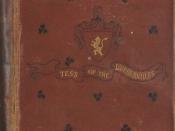The hypocritical and paradoxical standards and values of contexts dictated by Patriarchal societies often condemn women. As shown in Thomas Hardy's Tess of the D'Urbervilles and Lasse Hallström's 2000film, Chocolate, these texts act as prime example of challenges faced by women in accordance with the changes, social values and dominant attitudes in their respective time eras. The 19th century paradigms challenged and reflected include the role of women in society in accordance with the patriarchal world and their social levels. This notion is also emphasised in the 20th century time setting of the film.
The socio-economic circumstances surrounding a woman determined her level of rights in a patriarchal society as money ultimately equated with power. This notion was prevalent during the 19th century however Tess of the D'Urbervilles presents a stark contrast with this idea. The protagonist Tess is of the lower-working class yet she is also a "lineal descendent of the knightly family of the D'Urbervilles".
The importance placed on social ranking class in England also forces Tess to seek from help from Alec D'Urberville and ultimately brings about her downfall. Alec's addressing of Tess as "my beauty" confirms his sexual nature and the seduction of Tess by him causes Hardy to exclaim, "Why was it that upon this beautiful feminine tissue...there should have been traced such a coarse pattern" Hardy's authorial intrusion forces us to question whether Tess would've incurred this if class hadn't been given such an eminent role in 19th century England. Tess is a victim of this patriarchal society purely through her lack of her power. Thus through socio-economic standings, it is evident that the prejudice towards women of the lower class and bias towards women of the Upper class in inegalitarian societies is directly correlated with the power these two classes hold.
In Chocolat,


